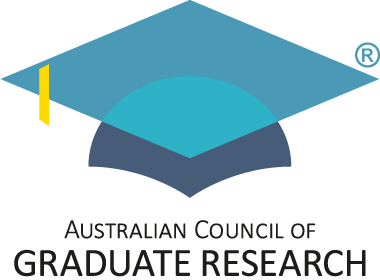Press Release: 15 July 2021
Contact: Fiona Zammit, Executive Director, Australian Council of Graduate Research
The 2021-2022 Budget announcements included financial incentives for universities that enrol PhD students in Industry internships. While the general thrust of this initiative is welcomed there is an urgent need to consult with the university and industry sectors to develop the right policy settings since there are already good examples of what works well in setting up internships between industry and PhD students.
The changes are part of the funding formula the government uses to distribute research money to universities to support students undertaking higher degrees by research. The changes are meant to take effect from 1 January 2022.
University sector and industry groups are in clear agreement about the benefits of research internships.
The Australian Council of Graduate Research Convenor, Professor Alastair McEwan, said: “Graduate research candidates undertaking a PhD or a Masters by Research represent a rich talent pool – possessing the domain knowledge, technical capabilities, transferable skills and professional standards to work on and solve industry-defined problems. Linking candidates with industry partners provides professional career development for students, builds workforce capacity and enhances innovation.”
The national employer association Ai Group has worked closely with ACGR to develop guidelines to support the breadth of ways industries can partner with graduate research candidates and Chief Executive Innes Willox has noted that “Research candidates can apply specialised cognitive, technical and research skills to provide creative solutions to challenging problems,” and “The relationships established through graduate research engagements enable closer, mutually beneficial connections between industry and universities at a time when the pace of change in industry is requiring new approaches to education and training.”
The current DESE proposal limits the incentives to PhDs who undertake a three-month internship in the first 18 months of their studies. What both universities and industry know is that internships are beneficial to both student and industry partner throughout the 4 years of study and may be more valuable after the first year, when PhD students have had a chance to develop their research expertise and transferable skills. Internships undertaken by Masters by Research students are also valuable for all parties; it is not obvious why internships for Masters students are not included in the new proposal.
Public consultation on the implementation of these changes has been promised but has not happened yet. The Australian Council of Graduate Research is deeply concerned that, without careful consideration, this narrow eligibility may result in unintended consequences which impact on the training of the next generation of researchers and not have the intended effect of boosting the interactions between Universities and Industry partners.
ACGR commends this refocus on building new employment pathways for research PhD students, with the aim of strengthening collaboration between universities and industry but urges the government to commence the consultation with students, universities and industry partners as soon as possible so that they can define and implement these changes to recognise the breadth of industry engagement mechanisms and achieve the most effective outcomes for all concerned.
ENDS
Additional information and references
- Details of proposed change
- 2021 Research Block Grant Allocations
- ACGR AiG Enhancing industry university engagement – a guide for industry
___________________________________________________________________
Press Contact:
Name: Fiona Zammit
Email:
Mobile: 0418995578
